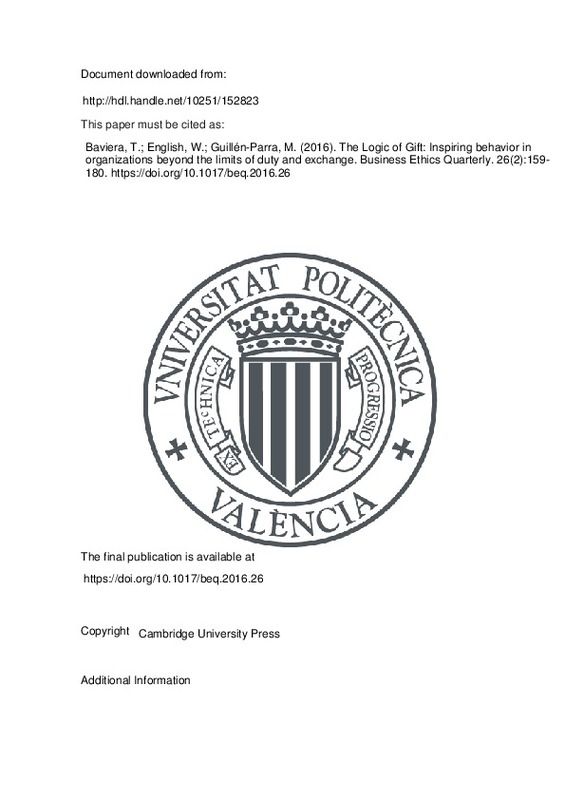Flynn, F. J. (2003). HOW MUCH SHOULD I GIVE AND HOW OFTEN? THE EFFECTS OF GENEROSITY AND FREQUENCY OF FAVOR EXCHANGE ON SOCIAL STATUS AND PRODUCTIVITY. Academy of Management Journal, 46(5), 539-553. doi:10.2307/30040648
Maslow, A. H. (1943). A theory of human motivation. Psychological Review, 50(4), 370-396. doi:10.1037/h0054346
Game, A., & Metcalfe, A. (1970). Presence of the Gift. Cultural Studies Review, 16(1). doi:10.5130/csr.v16i1.1441
[+]
Flynn, F. J. (2003). HOW MUCH SHOULD I GIVE AND HOW OFTEN? THE EFFECTS OF GENEROSITY AND FREQUENCY OF FAVOR EXCHANGE ON SOCIAL STATUS AND PRODUCTIVITY. Academy of Management Journal, 46(5), 539-553. doi:10.2307/30040648
Maslow, A. H. (1943). A theory of human motivation. Psychological Review, 50(4), 370-396. doi:10.1037/h0054346
Game, A., & Metcalfe, A. (1970). Presence of the Gift. Cultural Studies Review, 16(1). doi:10.5130/csr.v16i1.1441
Holmstrom, B., & Milgrom, P. (1991). Multitask Principal-Agent Analyses: Incentive Contracts, Asset Ownership, and Job Design. Journal of Law, Economics, and Organization, 7(special), 24-52. doi:10.1093/jleo/7.special_issue.24
Grant, A., & Dutton, J. (2012). Beneficiary or Benefactor. Psychological Science, 23(9), 1033-1039. doi:10.1177/0956797612439424
Organ, D. W. (1997). Organizational Citizenship Behavior: It’s Construct Clean-Up Time. Human Performance, 10(2), 85-97. doi:10.1207/s15327043hup1002_2
Melé, D. (2003). Journal of Business Ethics, 44(1), 77-88. doi:10.1023/a:1023298710412
Frankl, V. E. (1966). Self-Transcendence as a Human Phenomenon. Journal of Humanistic Psychology, 6(2), 97-106. doi:10.1177/002216786600600201
Inzer, L. D., & Crawford, C. B. (2005). A Review of Formal and Informal Mentoring. Journal of Leadership Education, 4(1), 31-50. doi:10.12806/v4/i1/tf2
Maes, H. (2004). Modesty, Asymmetry, and Hypocrisy. The Journal of Value Inquiry, 38(4), 485-497. doi:10.1007/s10790-005-3335-1
Rousseau, D. M., Sitkin, S. B., Burt, R. S., & Camerer, C. (1998). Not So Different After All: A Cross-Discipline View Of Trust. Academy of Management Review, 23(3), 393-404. doi:10.5465/amr.1998.926617
Ragins, B. R., Cotton, J. L., & Miller, J. S. (2000). MARGINAL MENTORING: THE EFFECTS OF TYPE OF MENTOR, QUALITY OF RELATIONSHIP, AND PROGRAM DESIGN ON WORK AND CAREER ATTITUDES. Academy of Management Journal, 43(6), 1177-1194. doi:10.2307/1556344
Faldetta, G. (2011). The Logic of Gift and Gratuitousness in Business Relationships. Journal of Business Ethics, 100(S1), 67-77. doi:10.1007/s10551-011-1188-z
Bock L . 2015. Can Google’s rules transform your workplace? Knowledge@Wharton . http://knowledge.wharton.upenn.edu/article/how-googles-rules-can-work-in-your-office/. Accessed 25 September 2015.
Frémeaux, S., & Michelson, G. (2011). ‘No Strings Attached’: Welcoming the Existential Gift in Business. Journal of Business Ethics, 99(1), 63-75. doi:10.1007/s10551-011-0749-5
Caligiuri, P., Mencin, A., & Jiang, K. (2013). Win-Win-Win: The Influence of Company-Sponsored Volunteerism Programs on Employees, NGOs, and Business Units. Personnel Psychology, 66(4), 825-860. doi:10.1111/peps.12019
McClelland, D. C. (1961). The achieving society. doi:10.1037/14359-000
Wrzesniewski, A., McCauley, C., Rozin, P., & Schwartz, B. (1997). Jobs, Careers, and Callings: People’s Relations to Their Work. Journal of Research in Personality, 31(1), 21-33. doi:10.1006/jrpe.1997.2162
Myerson R. B . 2007. Perspectives on mechanism design in economic theory . http://www.nobelprize.org/nobel_prizes/economic-sciences/laureates/2007/myerson_lecture.pdf. Accessed 15 May 2014.
Deci, E. L., & Ryan, R. M. (1985). Intrinsic Motivation and Self-Determination in Human Behavior. doi:10.1007/978-1-4899-2271-7
North, D. C. (2005). Understanding the Process of Economic Change. doi:10.1515/9781400829484
Lee, L., & Higgins, C. (2001). Corporate Volunteering. Journal of Corporate Citizenship, 2001(4), 79-90. doi:10.9774/gleaf.4700.2001.wi.00008
Ames, D. R., Flynn, F. J., & Weber, E. U. (2004). It’s the Thought That Counts: On Perceiving How Helpers Decide to Lend a Hand. Personality and Social Psychology Bulletin, 30(4), 461-474. doi:10.1177/0146167203261890
Van Ackere, A. (1993). The principal/agent paradigm: Its relevance to various functional fields. European Journal of Operational Research, 70(1), 83-103. doi:10.1016/0377-2217(93)90234-e
Pirson, M. A., & Lawrence, P. R. (2009). Humanism in Business – Towards a Paradigm Shift? Journal of Business Ethics, 93(4), 553-565. doi:10.1007/s10551-009-0239-1
Montes, L. (2003). Das Adam Smith Problem: Its Origins, the Stages of the Current Debate, and One Implication for Our Understanding of Sympathy. Journal of the History of Economic Thought, 25(1), 63-90. doi:10.1080/1042771032000058325
Gouldner, A. W. (1960). The Norm of Reciprocity: A Preliminary Statement. American Sociological Review, 25(2), 161. doi:10.2307/2092623
Godbout, J. T. (1998). The moral of the gift. The Journal of Socio-Economics, 27(4), 557-570. doi:10.1016/s1053-5357(98)80007-3
Grant, A. M. (2012). Giving Time, Time After Time: Work Design and Sustained Employee Participation in Corporate Volunteering. Academy of Management Review, 37(4), 589-615. doi:10.5465/amr.2010.0280
Podsakoff, N. P., Whiting, S. W., Podsakoff, P. M., & Blume, B. D. (2009). Individual- and organizational-level consequences of organizational citizenship behaviors: A meta-analysis. Journal of Applied Psychology, 94(1), 122-141. doi:10.1037/a0013079
Wright, R. F. (2000). Strategies for avoiding the micro management trap. Management Decision, 38(5), 362-364. doi:10.1108/00251740010340544
Borzaga, C., & Tortia, E. (2006). Worker Motivations, Job Satisfaction, and Loyalty in Public and Nonprofit Social Services. Nonprofit and Voluntary Sector Quarterly, 35(2), 225-248. doi:10.1177/0899764006287207
Ghoshal, S. (2005). Bad Management Theories Are Destroying Good Management Practices. Academy of Management Learning & Education, 4(1), 75-91. doi:10.5465/amle.2005.16132558
Solomon, R. C. (1998). The Moral Psychology of Business: Care and Compassion in the Corporation. Business Ethics Quarterly, 8(3), 515-533. doi:10.2307/3857435
Guillén, M., Ferrero, I., & Hoffman, W. M. (2014). The Neglected Ethical and Spiritual Motivations in the Workplace. Journal of Business Ethics, 128(4), 803-816. doi:10.1007/s10551-013-1985-7
Adloff, F., & Mau, S. (2006). Giving Social Ties, Reciprocity in Modern Society. European Journal of Sociology, 47(1), 93-123. doi:10.1017/s000397560600004x
Marion, J.-L., & Kosky, J. L. (2002). Being Given. doi:10.1515/9780804785723
Grant, A. M., Dutton, J. E., & Rosso, B. D. (2008). Giving Commitment: Employee Support Programs and The Prosocial Sensemaking Process. Academy of Management Journal, 51(5), 898-918. doi:10.5465/amj.2008.34789652
[-]







![[Cerrado]](/themes/UPV/images/candado.png)


